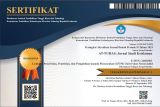Revitalisasi Nilai-Nilai Tauhid sebagai Upaya Mewujudkan Muslim Progresif dalam Beragama dan Bernegara: Interpretasi dan Aplikasi QS. Al-Baqarah [2]: 21-22 Perspektif Teori Hermeneutik Farid Esack
(1) * M. Sultan Latif Rahmatulloh
 (UIN Sunan Kalijaga Yogyakarta)
(UIN Sunan Kalijaga Yogyakarta) Indonesia
(*) Corresponding Author
AbstractAl Qur'an which is called idiom sālihu likulli zamān wa al-makān and Al Qur'an as hudan li al-nās should be able to be a solution for all aspects of life. On the other hand, the term monotheism is often only interpreted as a theological function that seems so sacred and final. Meanwhile, in the modern context, especially in a state, Al Qur'an is required to answer problems related to issues of the state, especially in Indonesia. By using Farid Esack's Hermeneutic theory, the researcher wants to interpret the verse of Tauhid QS. Al-Baqarah [2]: 20-21 and trying to apply it to the life of the state, especially in Indonesia to realize progressive Muslims. Based on the analysis carried out, the results show that the interpretation and application of QS. Al-Baqarah [2]: 20-21 in the perspective of Farid Esack's hermeneutic theory. If departing from the moral ideal of QS. Al-Baqarah [2]: 20-21 are orders to worship and be grateful for Allah's blessings. So looking at the context in a state, especially in Indonesia, there are three manifestations of the interpretation and application of QS. Al-Baqarah [2]: 20-21. First, tauhid means carrying out all the commands of Allah and staying away from all the prohibitions of Allah. second, in the context of Indonesian citizenship, monotheism should accept and respect all racial, ethnic, religious, and cultural differences in Indonesia. Third, tauhid in the context of Indonesian citizenship should take part in public spaces to promote and maintain the unity and welfare of the unitary state of Indonesia. Keywords: Tawheed, Hermeneutics, Progressive Muslims. |
Full Text: PDF
Refbacks
- There are currently no refbacks.
Copyright (c) 2020 M. Sultan Latif Rahmatulloh
This journal is licensed under a
Creative Commons Attribution-ShareAlike 4.0 International License





.png)






